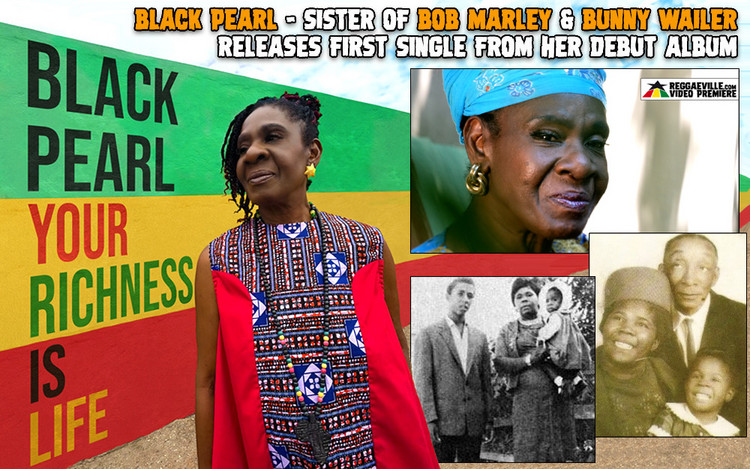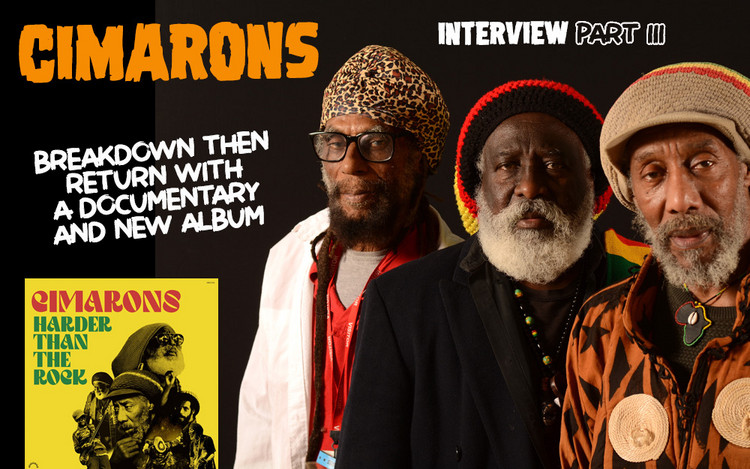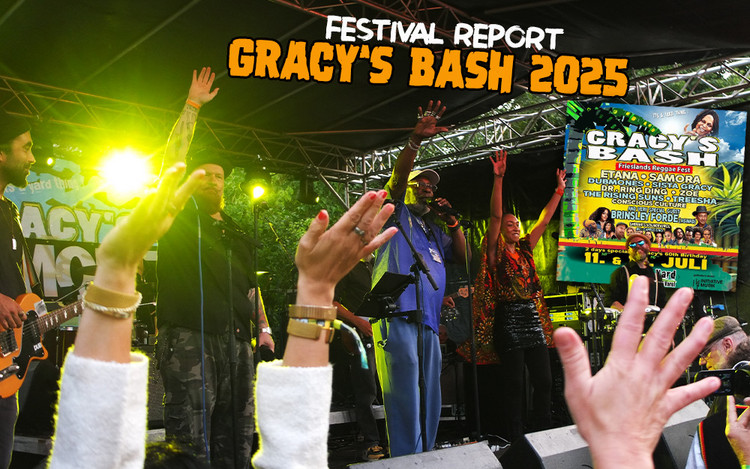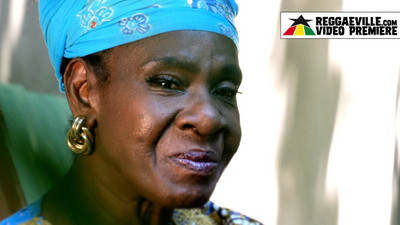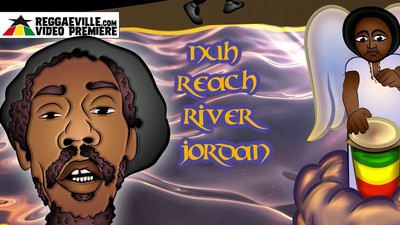Ganjaman ADD
Interview: Ganjaman
12/21/2012 by Valentin Zill
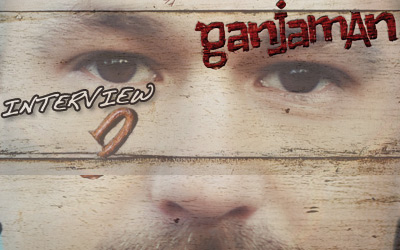
Berlin-based singjay Ganjaman has long been mocked by parts of the German reggae scene. He sings in German, covers Rastafari topics and still hopes that the world might be a better place tomorrow if we all join forces. With his latest album Jetzt ('Now'), Ganjaman stuns his last critics. Time to talk to the man who, even by his most captious critics, is considered to be one of the corner stones of the reggae movement in Germany. Ganjaman on the early days of his career, his new album, his unique approach to recording music, and current musical developments in Jamaica.
When I listened to tunes of yours for the first time, I had the impression that you translate Jamaican lyrics literally into German. Not that I don't understand Patois lyrics, but listening to Rasta talk expressions in German gave me a feeling of attending a church service for kids.
Originally, I really started with DJ style in Patois, in classical sound system style. But that was at a time - in the late 1980s, early 1990s -, when reggae here in Germany was an even more extreme subculture. Although some people kind of liked the music, they weren't really aware of its contents. When I grew older, I realized that some of the songs I listened to in the radio as a youth deal with different issues than I had assumed at that time. This microcosm opens with advanced English language skills. Initially, the impulse was to say, we want to transfer existing content into a language we can understand without constantly having to translate them in our heads. I mean, when we published the first LP, that was 2002, since then the consciousness of the listeners has changed much. Only since then an actual scene has developed here. And now the demand of the fans is certainly different. I can fully understand, especially from today's perspective, that people regard that as too exaggerated, too excessive or too emotionally exaggerated. But I find this totally legitimate for that time and the awareness at that time. In other words, I would certainly not record the songs I made ten years ago today, but they reflect a certain consciousness of those you made the music at the time as well as of those who listened to it.
What I found really striking were not your contents, but the point that content I accept without second thoughts when uttered in Patois sounds strange when expressed in German... Why do I accept that in Patois, but not on German?
For me, it was always important to reduce anglicisms as much as possible, to not use them at all if possible. I did the artwork for our first three LPs, and in their credits, I didn't write "dancehall mix", but "Tanzhallenmischung". That has to do something with a certain form of creativity, too. In the first LP's booklet, I included explanations for important terms, presented in a form similar to the Duden (the English equivalent being the Dictionary of Contemporary English). Where words were broken down and explained. Taking that to such extremes as avoiding all anglicisms in the booklet - nowadays I'm more relaxed in that regard, as I know that music transcends borders.
You've already performed in countries like Slovenia, Ukraine and Russia, where you certainly didn't meet too many German speakers. Do you still sing in German there? How is that received?
I explain much of the contents, as I do it in Germany anyway. The question how it works to perform German-speaking reggae abroad is risen from time to time. I return this question by mentioning that we in Germany are the best example how it works: over the course of 40, 50 years, we have listened exclusively to English-speaking music, to which we dance, love, argue, and feel.
Do or did you have the feeling of being confronted with prejudices towards yourself because you sing in German or treat the issues you treat?
Yes, of course. A lot. In recent years, it has become less of an issue because the young part of the audience just doesn't question that anymore. Our generation, we come from a period of time where, in the 90s, they said hip hop in German just doesn't work. Then it became the medium leading the market. Then, around 2000, people were like, reggae in German, with God and Jah and those stories… It went so far that I felt compelled to explain the conceptualization of "Babylon" and the term "Jah" from Luther's bible in the booklet of "Resonanz". Just to clarify where these terms actually come from, and how to understand them in a theological context. Since the last LP, "Das Gleiche Alte Lied", I realized that the acceptance has grown in the scene here. I deal with a lot of people where I know they don't like too much what I do musically, but that isn't the point. It is about the interpersonal and what we can collectively achieve. Sentinel or Pow Pow do not have to play my tunes in order for me to get along well with Nadia or Ingo. When we meet, we know that we are all part of a self created scene, and you can not erase us. You can ignore us as much as you want, you can consider the content to be ridiculous, but we are there and we'll stay and everyone's realized that by now.
Let us talk about your new album "Jetzt". Four years have passed since your last LP, how come you took yourself that much time to come up with a new album?
That is because I like to work on a gut level and because I am constantly busy with projects I really like to work on, although they are time-consuming. Especially in the last years, I produced quite some albums for other artists. And I do lots of sound engineering, mixing and mastering. I don't charge anything for most productions. In addition, I made video productions, as I am really up for them. Like Tippa Irie's and the Far East Band's single "Stick To My Roots": I video-recorded that myself, produced and edited it. As well as the two Heckert Empire videos, for example. "Gute Alte Zeit" is my works, as well as "Rangieren". I put a whole lot of love into these things, and learn a lot through them. And I really enjoy doing audiovisual media.
How did you record "Jetzt"? Did you produce everything yourself? With whom did you work together?
As far as the supervising production of the album is concerned, it is basically myself doing everything. Whereby the desire is always to get music as polychrome as possible. If I do everything myself, it sounds totally one-sided, and I can't stand that at all. Basically, the songs evolve in most various ways, at times in pretty unconventional ways. In this case, different producers are involved, as far as the production of the riddims is concerned. You'll find three songs from House of Riddim, two riddims from Feueralarm from Berlin, on which Big Finga (Gentleman's drummer) played a whole lot of drums. There's a French production - I already used two on my last album -, because I really rate those French productions. Especially in the field of roots. Then I have the honor to be allowed to use a riddim of Bobby Digital, the combination with Perfect. I produced one track together with Uwe Banton, as well as the combination with him. The instrumental has originally been created by Uwe, I just did the final production. Then there are some riddims composed by me alone. In principle, it is a mixed bag in what concerns the whole production and also the recording of the vocals. It all happened at my place. Kevin Metcalfe will do the mastering, as he did for the last album. In principle the songs always develop as an aside. That's why I should have called the album "Zwischen Tür Und Angel" ("As An Aside" or "In Passing").
Would you say that your approach to "Jetzt" was different to the ones to its predecessors?
I think and I hope to have further evolved with regards to my personal preferences or a certain emphasis content-wise. It is much less important to me now to tell the people what goes wrong in this world, I rather put an emphasis on reminding us that we can change the world for the better. That we are the key for a brighter tomorrow. I'd really wish to be able to really focus on an album production. That would mean, however, that I would have to take myself more seriously as an artist. Since I spend most of my time as a producer or sound engineer or thinking about how things can work in relation to each other, I loose the focus on myself too often. So I rarely think about my own recordings. But an album is always a compromise. Of course, I would want to have mixed everything from Stephen Stanley in Jamaica. However, the production budgets are not there. I can pay 3000€ once to someone to do the mixing. Or I can buy equipment for 3000€, teach myself how to use it, then the result is certainly a compromise, but I have created a basis for all subsequent productions, and we can use that. Of course it is important to keep a balance between people, to pay those involved. But I'm not the one who scrapes together production budgets, says: sum n is here now and we still need to pay Perfect for a combination. He was in studio with me and asked me, "Yo, wha happen to my Ganjaman combination?" He came to me! I deal with a whole lot of people, through dubplate recordings, for instance. The productions I've made in the last ten years. It would be easy to get Tony Rebel or Jah Mason or whoever on board and pay them for that. But that is not how things should work. Instead, what matters is that if we get together, we should create a great result with what is there and put that to use for the benefit of all. If we have a tune that simply works great, everyone will profit from that in the end.
Did you record the tune with Perfect together with him in the vocal booth?
We recorded parts of it together. I had a completely different text layout. We recorded together, but what you can hear now, especially my choruses, have been revised later. I would find that totally unremarkable to send a track to Jamaica, have somebody voice it and then respond to it. Which is a legitimate compromise, but in my case, my combinations are kind of thought through. As the one with Irie Revoltés, "Gerechtigkeit", where we perform together extremely interlocked. You have to write that together, you have to record that together.
Let us talk about the lyrical content of "Jetzt". You've got a few really political lyrics, of which I have the impression that they surpass the standard "Burn down Babylon" set phrases. Are you deeply engaged with politics?
Generally, yes. We are really active in our circle of friends and interested in, say, contemporary-secular, economical or political events. Whereby I don't want to see music too much as a political medium. But that's maybe why I take it a bit beyond that. I don't realize that too much myself. I still think it is "Das Gleiche Alte Lied" ("The Same Old Song/Story"). I think it is extremely important to deal with the things that happen out there. Because that shows us the possibilities we actually have, and the idea actually is to empower ourselves rather than continuously remind us of what doesn't work. An example: Our society is aligned primarily to secure itself financially, because we constantly think of money. Actually, our religion is the money. Money, however, is not at all part of our human chain of needs. Money is actually pretty irrelevant. If we buy drinking water of course, food, or love, money becomes a means to an end. Naturally. Then it changes its status, its quality within the chain of needs. But the chain of needs itself remains the same. And I believe that, if we some day reach a state in which we recognize the things that connect us, then we just look across national borders, we look across political boundaries, we look beyond our own moral boundaries and understand that we have more that unites us than things that differentiate us.
Let us talk a bit about the current state of things in Reggae. Obviously, the boom of the early years of the last decade could not go on forever. However, in the last two years a whole lot of new roots emerged in Jamaica. Raging Fyah, Pentateuch, Brina - everything that comes out of this Edna Manley College of Performing Arts environment.
It is especially important to keep in mind that those who coined this music in the 60s and 70s authoritatively were not the most virtuosic musicians. Reggae music is primarily percussive music. Thus you have the advantage: you do not have to be able to play virtuoso at all. It is actually music made by people who tried to imitate what they loved and reinterpret that. Their influence wasn't reggae, it was R'n'B, funk, jazz and all that stuff from the US. That has inspired the people to take up instruments. At that time there were neither the schools nor the funds to send one's Jamaican kids to a music school, nor did the people have money for instruments. And that's why you played with what was there. And that is why it was a primarily percussive interpretation. What few people know is that the Wailers' "Catch A Fire" was overdubbed and glazed at Island Records. In other words, the whole melodies have been recorded after Marley came with an eight-track tape on which only seven tracks had been used. One track had been left empty, imagine that luxury today. And the rest was then recorded by blues musicians, who played the solos. It took years until that could be fully transferred. Today we have the advantage that once again children are interested in learning to play an instrument. People want to play the bass or the guitar again and, most of all, nowadays they play on a level - they are really virtuosic musicians. They'll play any jazz, blues, or rock theme for you from scratch and virtuosic. So much so that I just sit there in amazement. And that of course means a very, very different quality. Without wanting to value one style more than the other.




